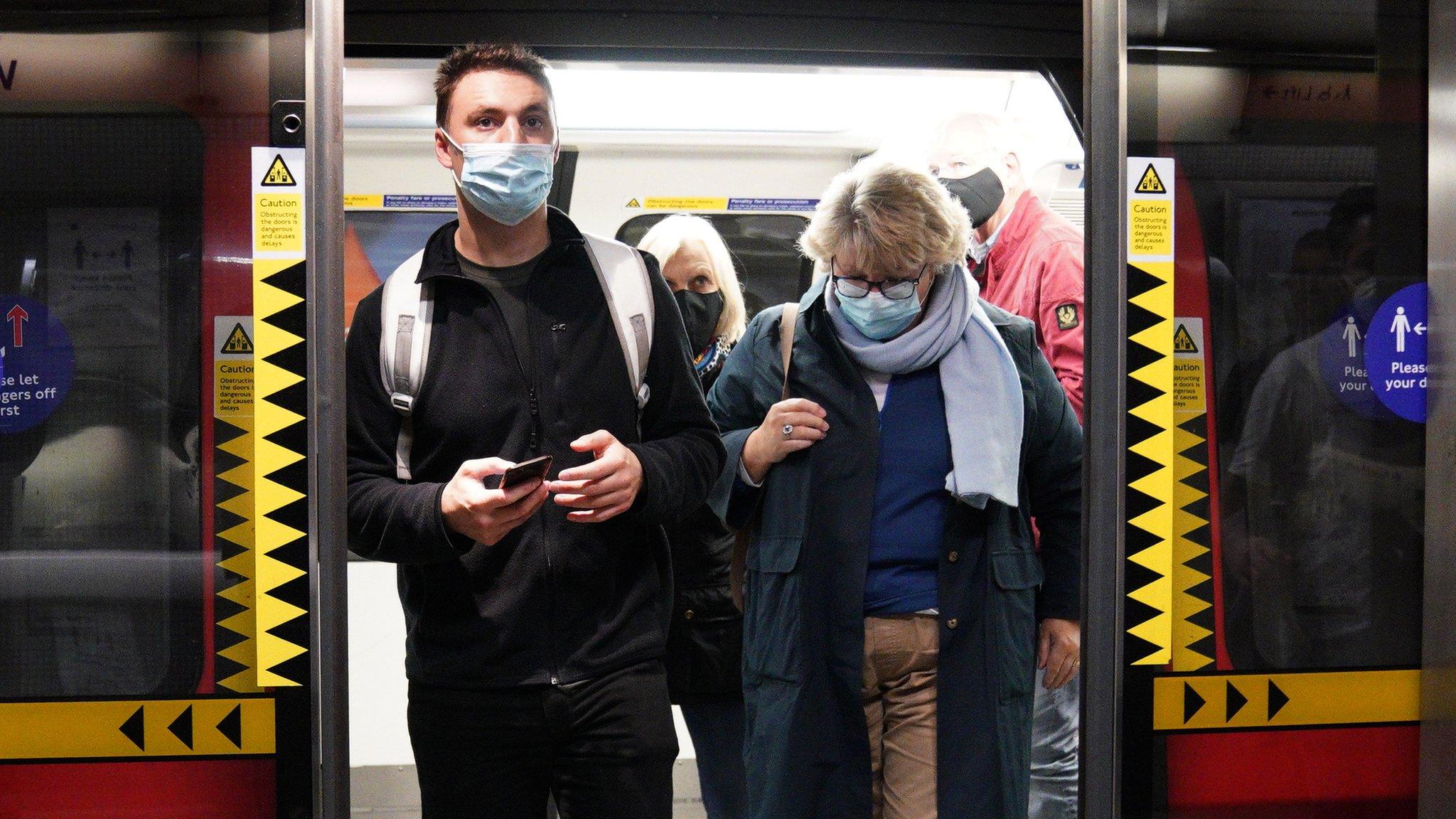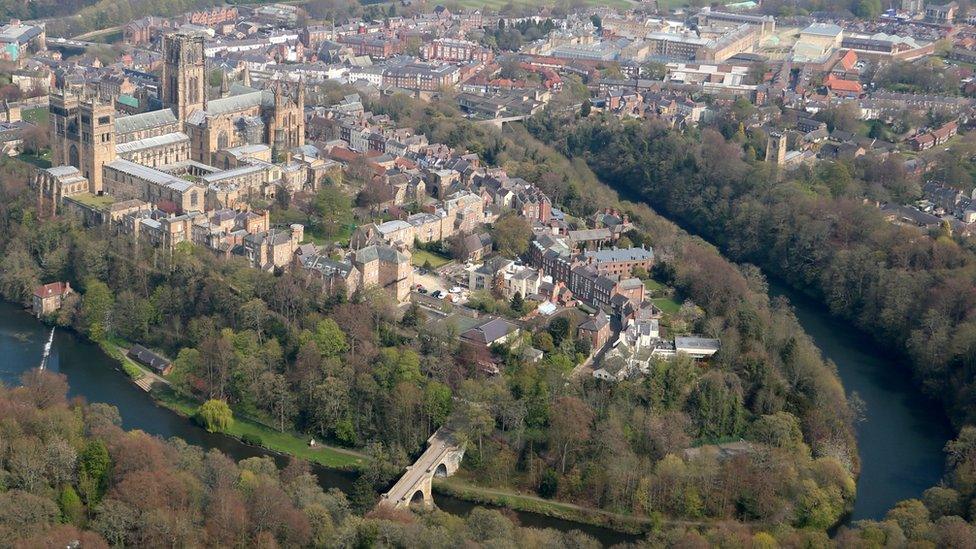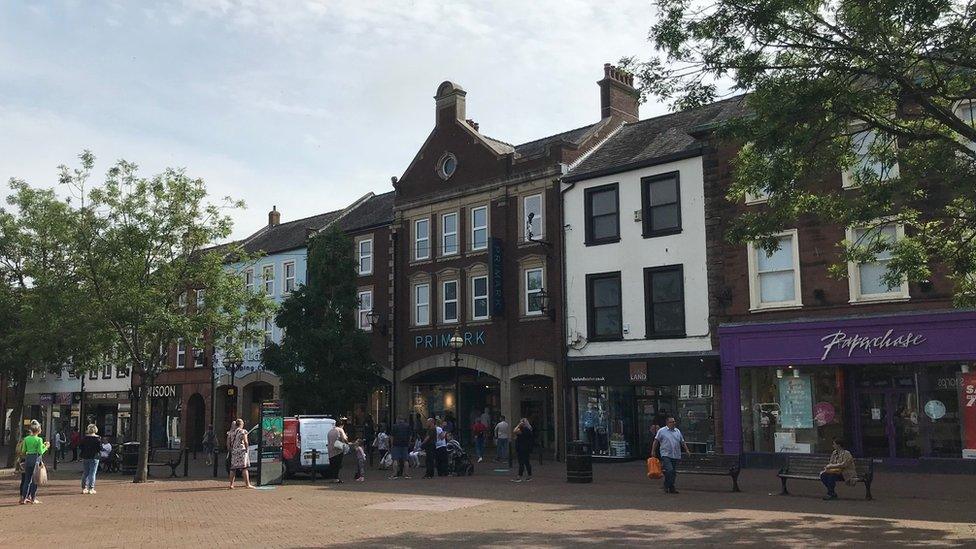Covid-19: Ministers striving to avoid blanket rules - Raab
- Published
- comments
Foreign Secretary Dominic Raab argues that a tiered local approach is more effective
The government is "striving" to avoid "blanket" coronavirus measures, Foreign Secretary Dominic Raab has said.
He told the BBC that ministers were "always ready" to introduce further restrictions, but said it was important to continue "targeting" the virus.
It comes amid calls to introduce a strict national lockdown in England.
Nottinghamshire has become the latest region to join the top tier of Covid-19 restrictions, after an overall rise in infection rates.
West Yorkshire will also join the third tier from Monday, at which point nearly a fifth of England will be under the toughest restrictions.
Meanwhile, Tees Valley leaders said they had been told by the government that tier three conditions would be imposed, but it is yet to be agreed.
The government also announced that the city of Carlisle is to move into tier two restrictions from Saturday - just hours before the rules are due to come into force.
It comes as a further 24,405 Covid cases are reported in the UK - taking the total number of positive tests recorded to 989,745 - as well as a further 274 deaths within 28 days of a positive test.
Every area of England is now in one of three coronavirus alert categories - medium (tier one), high (tier two) or very high (tier three). Scotland has five levels of restrictions.
Under tier three rules in England, pubs and bars not serving substantial meals must shut, while household mixing is banned indoors and outdoors in private gardens, most outdoor venues and ticketed events. Further restrictions can be introduced for individual areas.
A document from government advisers the Scientific Advisory Group for Emergencies estimates Covid was spreading "significantly" faster through England by mid-October than even the government's predicted "worst-case" scenario - with between 43,000 and 74,000 people being infected every day.
And according to the latest figures from the Office for National Statistics, about one in 100 people in homes in England had coronavirus in the week ending 23 October - equating to about 570,000 people. This is almost a third higher than the figure for the previous week - 430,000.
The ONS also estimates there were about 52,000 new infections each day in homes in England in the same week, up roughly half on last week's number (35,000). The 52,000 figure is half the estimate of 100,000 a day from another study, the authors of which said the country is at a "critical stage" and "something has to change".
The reproduction number, or R value, of coronavirus transmission across the UK remains above 1 - with data showing the estimate is between 1.1 and 1.3.
'Targeting the virus'
Speaking to BBC Radio 4's Today programme, Mr Raab said ministers were "confident" they had "the right measures and framework in place, which is not to have a blanket approach but to target measures [...] on the areas where the uptick is highest".
He said this was the most effective way to tackle the virus "and avoid the blanket approach, which I don't think would be the best interest in the country, and which we are striving to avoid".
Mr Raab added there had been "a decrease in the rate of growth" since the government had adopted that approach, although he admitted "clearly there is still an uptick in the virus".
However, the foreign secretary did not deny ministers were considering bringing in an even higher, fourth tier of restrictions.
He added: "We're always ready for further measures that we can take. But I think the most important thing about further measures is that we continue on the track we're on of targeting the virus."


On BBC Breakfast, Mr Raab insisted the public would find it "desperately unfair" for measures to be brought in across the country "while rates vary".
Asked whether a national lockdown was now inevitable, he said targeted measures were "the right thing to do", and appealed for "full compliance and full co-operation" in high-risk coronavirus regions to avoid more stringent measures.
He said schools and businesses had been kept open in tier three areas but the government had left in "reserve the option of taking further measures".
Earlier, Labour's leader Sir Keir Starmer told the programme he was "deeply concerned" by rising infection rates, and said: "That's why we called for a circuit-break [lockdown] over half term."
"The prime minister didn't choose that course and my concern is that the tier system is not strong enough to stop the infection rate going up," Sir Keir added.
A so-called "circuit-breaker" is a short limited lockdown of about two to three weeks.

SOCIAL DISTANCING: What are the rules now?
SUPPORT BUBBLES: What are they and who can be in yours?
FACE MASKS: When do I need to wear one?
TESTING: What tests are available?

In Nottinghamshire - unlike some other tier three areas - betting shops, saunas, tattoo parlours and nail salons must close.
Alcohol cannot be sold after 21:00 GMT in shops, but can be sold until 22:00 if bought "in hospitality venues where accompanying a substantial meal".
On Thursday evening, young people took to the streets of Nottingham in fancy dress before the new restrictions came into force.
Crowds gather in Nottingham ahead of new restrictions
The Department of Health and Social Care has said leisure and sports facilities, such as gyms, will be allowed to stay open in West Yorkshire when it moves to tier three.
It also said more than a dozen more regions will move from the lowest to the middle tier of restrictions on Saturday.
These include East Riding of Yorkshire, Kingston-Upon-Hull, North East Lincolnshire, North Lincolnshire, Dudley, Staffordshire, Telford, Wrekin, Amber Valley, Bolsover, Derbyshire Dales, Derby City, South Derbyshire, the whole of High Peak, Charnwood, Luton and Oxford.
Meanwhile, Scotland's new tiered system of restrictions will come into force at 06:00 on Monday, and Wales remains under a 17-day "firebreak" lockdown until 9 November.
Wales' First Minister Mark Drakeford said a new set of national rules will be brought in once the lockdown ends, rather than a "network of local restrictions".
Pubs and restaurants in Northern Ireland were closed for four weeks starting on 16 October, with the exception of takeaways and deliveries. Schools were closed for two weeks.
In other coronavirus developments:
Infection rates have been rising across the Channel, with France and Germany both turning to forms of lockdown to control the virus
Giving false information to NHS contact tracers will become a criminal offence in Wales
Senior pupils and their teachers in some areas of Scotland are being advised to wear face coverings in classrooms

BBC IPLAYER EXCLUSIVE: Would you like a sneak peek at brand new series Small Axe?
HAS COVID STOLEN MY FUTURE?: The long-term consequences of the pandemic on young people

- Published30 October 2020

- Published30 October 2020

- Published30 October 2020
